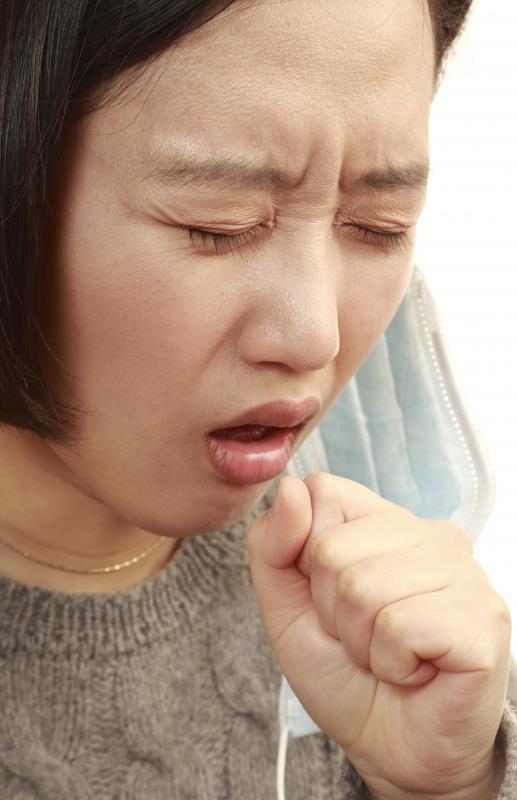At TheHealthBoard, we're committed to delivering accurate, trustworthy information. Our expert-authored content is rigorously fact-checked and sourced from credible authorities. Discover how we uphold the highest standards in providing you with reliable knowledge.
What are the Dangers of Glue Huffing?
Glue huffing is a form of inhalant abuse in which an individual deliberately concentrates and breathes fumes present in glues, resulting in feelings of euphoria, disorientation, and hallucinations. There are many immediate and long-lasting dangers associated with recreational glue huffing. People can experience irreversible brain, heart, and lung damage, hearing loss, nervous system problems, and other effects incurred by inhaling dangerous toxins. Chronic glue huffing can also lead to dependence and addiction, increasing the chances of overdose and death.
People who huff glue might sniff fumes directly from a bottle, or cover his or her mouth with a paper bag filled with the substance. The chemicals present in glue permeate the blood-brain barrier and react with neurotransmitters to produce euphoric sensations. Users immediately begin to feel lightheaded and disoriented, and may experience hallucinations. Within a few minutes, however, individuals suffer health consequences such as headaches, nausea, slurred speech, hearing and vision problems, vomiting, and difficulty controlling muscle movement. As a user continues to come down from his or her high, feelings of fatigue and depression arise.

Other short-term dangers of glue huffing include inflammation and irritation of the nose and throat and the development of a cough or wheeze. A user may pass out after huffing glue, presenting the possibility of suffocation if a bag is still attached to his or her face. The lack of oxygen intake can lead to asphyxiation, and a person could easily choke on his or her vomit if still disoriented or unconscious. Additional environmental dangers exist when a disoriented user attempts to walk, drive, or engage in an activity that is difficult when under the influence of inhalants.

There are many dangers associated with long-term abuse, including damage to the brain, lungs, and heart. Glue huffing kills brain cells and, over time, changes brain's chemistry and function. Many people suffer from permanent damage in the areas of their brain that control motor movement, speech, hearing, and concentration. Liver and kidney damage are possible when large amounts of toxic chemicals are constantly present in the bloodstream, and heart failure is possible due to insufficient amounts of oxygen and healthy nutrients in the blood.

Chemical dependency and addiction present additional immediate dangers. An individual can develop a tolerance to glue chemicals over time, meaning that he or she must huff more and more of the substance in subsequent uses to achieve the same effects. Large doses of glue are highly toxic, and the effects can lead to intense physical suffering and death.
AS FEATURED ON:
AS FEATURED ON:


















Discussion Comments
Well I have something to say about glue huffing. I have been huffing for over the past seven or eight years, but to my dismay, the entire scenario has changed all together. I don't get high even if I huff a barrel of dendrite. Instead, I have this rather peculiar feeling that I’m in the middle of the action, but the sound and the effects are just too darn real to ignore.
There was a story that I have started to a part of and I'm really not in a mood to talk to anyone regarding this as they always consider it a joke and laugh away. I have been getting continuous warnings about something real bad. I don’t have words to explain what I feel, even when I sniff a hint of dendrite, even if I smell it from a yard away. The story starts to unfold and I’m caught right in the middle of the action.
I’m not telling this for you guys to make fun of me. I am requesting you all to please suggest to me a few good psychiatrists with whom I can collaborate and go for further examinations so that I can unfold the mystery that keeps me from dying.
I don't get fatigue, but I do get headaches afterwords. When I get high, I get light-headed, giggly and dizzy
I've often wondered if legalizing things like marijuana would cause people to try things like glue huffing less often. It seems to me that the main problem with glue huffing is that is inexpensive and easy to come by. People want that euphoric feeling and are willing to get anything to do it.
I really believe that the legalization of marijuana and public education about it would give those who want a high, a safe and cheap high. They could have their feelings of euphoria without causing brain damage or endangering their life.
Do you think that the control and legalization of a safer drug such as marijuana would prevent people from glue huffing? Or do you think people would still try glue huffing, despite the serious danger?
A lot of teenagers seem to get into glue huffing because it offers a cheap and quick high. I was shocked when I learned that a few of my friends had tried it and thought that it was such a great thing. Luckily they didn't do it very often and eventually quit because of the signs it was showing on their skin, but I was surprised that anyone I knew would be into something like that.
A good clue that someone is glue huffing is that they can develop a rash around the mouth and nose area that is caused by the chemicals they are huffing. The reddened area of skin is actually from a chemical burn that you can get from getting toxic fumes to close to your face.
I work in an emergency room and we used to get bums all the time who had been sniffing glue or spray paint and had passed out or hurt themselves somehow. These were some of the worst patients because they were often very disoriented and belligerent. Me and the other nurses would dread getting the assignment to look after one of these patients.
But you have to feel a certain amount of sympathy. I have seen what glue sniffing does to people. No one would make this choice for themselves unless they had a lot of pain and struggle in their lives. I have to think that if these men and women had more of a support system behind them whether it be a family a church or the government they would not have to make such dangerous choices with their lives
@SurfNTurf - I was watching a documentary about this sort of thing the other day and they said that kids inhale all sort of things, not just glue.
Some inhale spray paint, deodorants and room deodorizers, nail polish and even permanent markers. I couldn’t believe it. I have all of these things in my house and never thought this could be used in that way.
According to the program, they said that the average age of a child's first time experimenting with this sort of thing is 13. They added that about one out of five kids in the eighth grade have tried glue huffing in order to get high.
@Tigers88 - I am so sorry that you and your family are going through this rough time. I will say a prayer for your brother.
I would love to see more drug prevention education programs both for the kids and the parents that talk about the dangers of these common household items because many parents are probably not even aware that glue or other things found in their home can be a threat to their child.
It is scary to think that a lot of these things that can hurt your children can be found in your home. I was reading a story about a 21 year old that had been sniffing glue for a few months and was brought into the emergency room twice, but the second time he suffered a heart attack and died.
They said that some of the symptoms he suffered from sniffing glue involved repeated headaches and clumsiness along with bouts of aggression with the tendency to become argumentative at times.
The really sad thing is that since these itmes are so readily available many kids have unlimited access to some of these products that may actually kill them.
I think that it is sad that some young kids resort to things like glue huffing. I think that they probably learn about it from their peers at school and experiment with it in order to get this short term thrill because they don’t think that anything will happen to them.
I think that when you are really young you tend to take your life for granted because you almost think that you are going to live forever. This is why I keep a close eye on my children and tell them about the dangers of drugs.
This is an issue that I know all too much about. It has been the number one issue in my family for over 5 years now. My brother got addicted to glue towards the end of high school and he has been on a long slow decline ever since.
The glue sniffing lead to other drugs, problems with the police, shady friends and a really rough lifestyle. He would go for long stretches witohut talking to anyone in the family and then show op begging for money. It was absolute hell on my parents. They wanted to help but they also didn't want to enable him.
We pleaded for him to go to rehab but he would never get any help. No one has heard anything from him for about 6 months. I pray every night that we will hear something, a call or a card or a knock on the door. I know that his problems go deeper than glue sniffing but this was the first step down a dark path. It has torn our family apart. No one should get involved with this horrible habit.
Post your comments